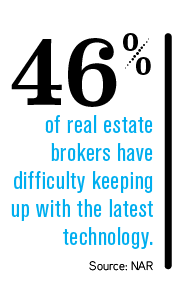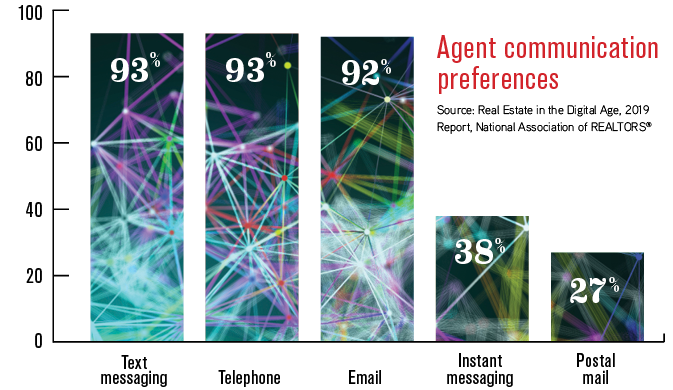Improved communication tools allow agents to reach their customers at any time and from any place
By Regina Ludes
When Judy Poitevent, CRS, started her real estate company WATERStreet Realty, LLC, in Excelsior, Minnesota, five years ago, she eschewed the traditional website in favor of a Facebook business page. The Facebook site allows people to share and comment on her posts, which frequently prompts a dialogue leading to a business partnership.
“I think most agent websites are too static and don’t allow for interaction with visitors,” Poitevent explains. “I also realized that many of my clients were finding me on Facebook rather than through other sites.”
As real estate technology continues to evolve, agents are under pressure to keep up with the changes. According to the National Association of REALTORS®, 46% of real estate brokers have difficulty keeping up with the latest technology.

In spite of that difficulty, agents like Poitevent understand that the best communications tech tools aren’t necessarily the newest or the most expensive, but rather they are existing technologies that are being used in different ways, and sometimes in tandem with other platforms. Before settling on a certain technology, agents need to understand their clients’ communications needs and preferences. Once you know how they want you to connect with them—and how often—you can use technology more effectively to build a profitable long-term partnership.
“Don’t pick the technology first,” cautions Mark Porter, CRS, broker/owner with Castle Hills Real Estate in Lewisville, Texas, and an RRC instructor. “Focus on how you want to stay in touch with people, then pick the tools that help you do that.”
It’s all in the wrist
When driving around the suburbs of Minneapolis, Poitevent doesn’t have to constantly check her smartphone for messages because her Samsung smartwatch does it for her. Equipped with a separate phone line, the watch enables Poitevent to receive text messages from clients if they can’t reach her on her smartphone.
“I won’t answer my phone while I’m driving, which may be unsafe, but if I get a message on the watch that I need to respond to, I’ll send a thumbs up emoji so the client knows I got their message,” says Poitevent.
The smartwatch is handy during Poitevent’s face-to-face meetings, too. By rotating it to the inside of her wrist, the other person can’t see her messages. “I don’t have to interrupt the meeting to dig my phone out from my purse, and the other person in the meeting doesn’t feel that I’m not paying attention to them,” she says.
The human side of video
“Using video gives my messages a human face and a voice,” says Mark Handlovitch, CRS, an associate broker with RE/MAX Real Estate Solutions in Pittsburgh. “While most agents may send a text message or mail a card to wish someone happy birthday, a video message makes the client feel like they’re talking to a real human being.”
He also likes the immediacy and convenience that videos provide. “When a lead reaches out to me, I can record a message while I’m at my son’s hockey game and send it to that person within minutes after their initial contact,” he says. Some prospects may be hesitant when they first approach you, though they may still want the human touch, he adds “With the humanizing element of video, they can enter the relationship at their own pace.”
Handlovitch sends the videos via email or text messages using the platform Bombbomb. The all-inclusive platform has email tracking and screencast capabilities similar to older programs he used, such as Yesware and Screencast. With Bombbomb, Handlovitch uses one platform to do most of his marketing and administrative tasks more efficiently.
Recently, he began using Prompt, customized for RE/MAX agents to send pre-formatted emails to clients for birthdays and anniversaries. “The platform alerts me when an email is scheduled to go out and prompts me to add video if I want to,” explains Handlovitch. Since so many other platforms are integrated into Bombbomb, Handlovitch says he’s been able to reduce the number of individual platforms he uses.
Matchmaking for agents
Rebecca Carter, CRS, with eXp Realty in Knoxville, Tennessee, touts the advantages of HomeLight, an online platform that matches agents with clients. “HomeLight gets me in front of buyers and sellers that I would never have met because many of them are out of state and aren’t within my sphere,” says Carter.
HomeLight interviews clients to determine their specific housing needs. Then it uses an algorithm to determine which three agents are the best fit for the client and sends a message to those agents for follow up. In the five years she has used HomeLight, the leads have paid off consistently in closed transactions, and in some cases, friendships. While she pays a 25% referral fee for leads, it is only paid if and when she closes a deal.
Mark Porter, CRS, with Castle Hills Real Estate in Lewisville, Texas, who teaches “Technologies to Advance Your Business” and other RRC courses, offers these tips for using technology to connect with your clients. |
|
DO |
DON’T |
| Keep in mind the client’s preferred method of communication. Communicate with clients and prospects in the way they prefer to be contacted, not your own preference. | Choose the technology first. Keep your focus on staying in touch with people, then select the tool that best helps you do that. |
| Use multiple methods of communication. A single message can be distributed in several different ways, and each client has their preferred method for receiving it. | Be too easily enticed by the newest flashy tech tools on the market. Before buying new or upgrading an existing platform, consider if it will benefit your relationship with clients. |
| Create a hyperlocal presence in your market. Be visible in your community. When participating in local events, take live video or photos to share on your website to show your involvement in the community. | Waste money on technologies that don’t produce the best results. If your lead generation platform isn’t producing quality leads, discontinue using it. |
Connecting with social media
When using social media, Poitevent keeps her interactions casual and avoids discussing private matters. She never shares photos of sold properties that include the buyer’s image or name and she never posts documents and agreements. “It would break my confidentiality agreement with my clients,” says Poitevent.
Carter’s how-to videos on Instagram provide helpful advice to her clients, such as how to polish kitchen cabinets or how to remove spots from carpets. “I like to give followers insight into my personality so they feel more comfortable about working with me,” Carter says.
With so many technology options available, agents may be tempted to check out as many of them as possible to better themselves and their business, Carter says. But don’t let the technology get in the way. “You have to remind yourself that the focus is still on the client,” Carter says.
Another danger is automating activities to a point that you don’t think about what you’re doing and why. “Technology can push us to do things in a robotic manner,” says Porter. “But real estate is still a relationship business, and technology is supposed to help us stay in touch.”

For guidance on technologies for effectively working with today’s connected consumers, check out the “Technology and Plans for Success” classroom course starting in August. Go to CRS.com/catalogsearch for more information.








